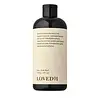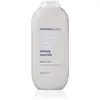Loved01 Face + Body Wash Versus Method Body Wash
What's inside
What's inside
 Key Ingredients
Key Ingredients

No key ingredients
 Benefits
Benefits

 Concerns
Concerns

 Ingredients Side-by-side
Ingredients Side-by-side

Water
Skin ConditioningMyristic Acid
CleansingStearic Acid
CleansingPotassium Hydroxide
BufferingCocamidopropyl Betaine
CleansingPalmitic Acid
EmollientLauryl Glucoside
CleansingGlycol Distearate
EmollientCocos Nucifera Oil
MaskingSimmondsia Chinensis Seed Oil
EmollientButyrospermum Parkii Butter
Skin ConditioningSodium Hyaluronate
HumectantCamellia Sinensis Leaf Extract
AntimicrobialRosa Canina Seed Oil
EmollientHippophae Rhamnoides Oil
EmollientLecithin
EmollientTocopheryl Acetate
AntioxidantJuniperus Virginiana Wood Oil
PerfumingAbies Sibirica Oil
MaskingJuniperus Communis Fruit Oil
MaskingPhenoxyethanol
PreservativeEthylhexylglycerin
Skin ConditioningWater, Myristic Acid, Stearic Acid, Potassium Hydroxide, Cocamidopropyl Betaine, Palmitic Acid, Lauryl Glucoside, Glycol Distearate, Cocos Nucifera Oil, Simmondsia Chinensis Seed Oil, Butyrospermum Parkii Butter, Sodium Hyaluronate, Camellia Sinensis Leaf Extract, Rosa Canina Seed Oil, Hippophae Rhamnoides Oil, Lecithin, Tocopheryl Acetate, Juniperus Virginiana Wood Oil, Abies Sibirica Oil, Juniperus Communis Fruit Oil, Phenoxyethanol, Ethylhexylglycerin
Water
Skin ConditioningSodium Lauryl Sulfate
CleansingCocamidopropyl Betaine
CleansingParfum
MaskingCoumarin
PerfumingHexyl Cinnamal
PerfumingLinalool
PerfumingPolyglyceryl-3 Laurate
EmulsifyingGlycol Distearate
EmollientMethyl Glucose Caprate/Caprylate/Oleate
EmollientPropanediol
SolventAmmonium Chloride
BufferingCoco-Glucoside
CleansingDecyl Glucoside
CleansingC10-18 Triglycerides
EmollientLauryl Lactate
EmollientOryza Sativa Bran Extract
Skin ConditioningCocos Nucifera Oil
MaskingButyrospermum Parkii Butter Extract
Skin ConditioningGlycerin
HumectantTetrasodium EDTA
Glyceryl Oleate
EmollientGlycol Stearate
EmollientCitric Acid
BufferingEthylhexylglycerin
Skin ConditioningSodium Benzoate
MaskingSodium Hydroxide
BufferingPotassium Sorbate
PreservativePhenoxyethanol
PreservativeMethylchloroisothiazolinone
PreservativeMethylisothiazolinone
PreservativeWater, Sodium Lauryl Sulfate, Cocamidopropyl Betaine, Parfum, Coumarin, Hexyl Cinnamal, Linalool, Polyglyceryl-3 Laurate, Glycol Distearate, Methyl Glucose Caprate/Caprylate/Oleate, Propanediol, Ammonium Chloride, Coco-Glucoside, Decyl Glucoside, C10-18 Triglycerides, Lauryl Lactate, Oryza Sativa Bran Extract, Cocos Nucifera Oil, Butyrospermum Parkii Butter Extract, Glycerin, Tetrasodium EDTA, Glyceryl Oleate, Glycol Stearate, Citric Acid, Ethylhexylglycerin, Sodium Benzoate, Sodium Hydroxide, Potassium Sorbate, Phenoxyethanol, Methylchloroisothiazolinone, Methylisothiazolinone
Ingredients Explained
These ingredients are found in both products.
Ingredients higher up in an ingredient list are typically present in a larger amount.
Cocamidopropyl Betaine is a fatty acid created by mixing similar compounds in coconut oil and dimethylaminopropylamine, a compound with two amino groups.
This ingredient is a surfactant and cleanser. It helps gather the dirt, pollutants, and other impurities in your skin to be washed away. It also helps thicken a product and make the texture more creamy.
Being created from coconut oil means Cocamidopropyl Betaine is hydrating for the skin.
While Cocamidopropyl Betaine was believed to be an allergen, a study from 2012 disproved this. It found two compounds in unpure Cocamidopropyl Betaine to be the irritants: aminoamide and 3-dimethylaminopropylamine. High-grade and pure Cocamidopropyl Betaine did not induce allergic reactions during this study.
Learn more about Cocamidopropyl BetaineCocos Nucifera Oil is obtained from the kernels of the coconut fruit. In other words, this is coconut oil.
Coconut Oil is rich in fatty acids with lauric acid making up the majority of these. It also contains linoleic acid. Due to this high fatty acid content, coconut oil helps trap moisture and soften skin.
Despite being antibacterial, coconut oil may not be great for acne-prone skin. It is comedogenic and may clog pores. This ingredient may not be safe for malassezia or fungal acne.
Note: Coconut Oil should not replace your sunscreen for UV protection. Studies show it only blocks about 20% of UV.
This oil is non-volatile and has a light scent.
The term 'fragrance' is not regulated in many countries. In many cases, it is up to the brand to define this term. For instance, many brands choose to label themselves as "fragrance-free" because they are not using synthetic fragrances. However, their products may still contain ingredients such as essential oils that are considered a fragrance.
Learn more about Cocos Nucifera OilEthylhexylglycerin (we can't pronounce this either) is commonly used as a preservative and skin softener. It is derived from glyceryl.
You might see Ethylhexylglycerin often paired with other preservatives such as phenoxyethanol. Ethylhexylglycerin has been found to increase the effectiveness of these other preservatives.
Glycol Distearate serves as a pearlizing or opacifying agent in cosmetic products.
It's often included in cleansers and haircare products to give them a lustrous or shimmering appearance.
It is derived from stearic acid, a natural fatty acid commonly found in vegetable oils and animal fats.
Glycol Distearate isn't fungal acne safe.
Learn more about Glycol DistearatePhenoxyethanol is a preservative that has germicide, antimicrobial, and aromatic properties. Studies show that phenoxyethanol can prevent microbial growth. By itself, it has a scent that is similar to that of a rose.
It's often used in formulations along with Caprylyl Glycol to preserve the shelf life of products.
Water. It's the most common cosmetic ingredient of all. You'll usually see it at the top of ingredient lists, meaning that it makes up the largest part of the product.
So why is it so popular? Water most often acts as a solvent - this means that it helps dissolve other ingredients into the formulation.
You'll also recognize water as that liquid we all need to stay alive. If you see this, drink a glass of water. Stay hydrated!
Learn more about Water